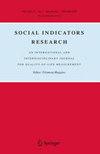Why Cross-Country Convergence of Income is Unsustainable: Evidence from Inclusive Wealth in 140 Countries
IF 2.8
2区 社会学
Q1 SOCIAL SCIENCES, INTERDISCIPLINARY
引用次数: 0
Abstract
Abstract Recent economic convergence studies show that cross-country income inequalities have declined since the 1990s. However, this study finds that this episode of income convergence is unsustainable in the long run because countries' capacity to earn income diverges. Specifically, the paper analyses the convergence of per-capita Inclusive Wealth, which comprises all capital assets that contribute to the production of goods and services and the well-being of its society. Utilizing a diverse array of techniques to estimate convergence in a sample of 140 countries between 1990 and 2010, the paper demonstrates the simultaneity of unconditional convergence of GDP and unconditional divergence of Inclusive Wealth. Natural-resource-rich countries that lack human capital, in particular, appear unable to match the global per capita Inclusive Wealth growth rate. A trend emerges towards a bimodal Inclusive Wealth distribution with a substantial low-wealth peak. Thus, although swift income convergence appears promising for developing nations, I caution against optimism. When considering a more appropriate measure of future well-being, such as Inclusive Wealth, the economic outlook for many countries is bleaker than recent studies suggest.跨国收入趋同为何不可持续:来自140个国家包容性财富的证据
最近的经济趋同研究表明,自20世纪90年代以来,跨国收入不平等有所下降。然而,本研究发现,从长期来看,这种收入趋同现象是不可持续的,因为各国赚取收入的能力存在差异。具体而言,本文分析了人均包容性财富的收敛性,其中包括有助于商品和服务生产以及社会福祉的所有资本资产。利用多种技术估计1990年至2010年间140个国家样本的收敛性,本文证明了GDP的无条件收敛和包容性财富的无条件发散的同时性。特别是缺乏人力资本的自然资源丰富的国家,似乎无法赶上全球人均包容性财富增长率。出现了一种双峰式包容性财富分配的趋势,其中有一个相当低的财富峰值。因此,尽管迅速的收入趋同似乎对发展中国家很有希望,但我警告不要乐观。考虑到更合适的衡量未来福祉的指标,如包容性财富,许多国家的经济前景比最近的研究表明的更为黯淡。
本文章由计算机程序翻译,如有差异,请以英文原文为准。
求助全文
约1分钟内获得全文
求助全文
来源期刊

Social Indicators Research
Multiple-
CiteScore
6.30
自引率
6.50%
发文量
174
期刊介绍:
Since its foundation in 1974, Social Indicators Research has become the leading journal on problems related to the measurement of all aspects of the quality of life. The journal continues to publish results of research on all aspects of the quality of life and includes studies that reflect developments in the field. It devotes special attention to studies on such topics as sustainability of quality of life, sustainable development, and the relationship between quality of life and sustainability. The topics represented in the journal cover and involve a variety of segmentations, such as social groups, spatial and temporal coordinates, population composition, and life domains. The journal presents empirical, philosophical and methodological studies that cover the entire spectrum of society and are devoted to giving evidences through indicators. It considers indicators in their different typologies, and gives special attention to indicators that are able to meet the need of understanding social realities and phenomena that are increasingly more complex, interrelated, interacted and dynamical. In addition, it presents studies aimed at defining new approaches in constructing indicators.
 求助内容:
求助内容: 应助结果提醒方式:
应助结果提醒方式:


